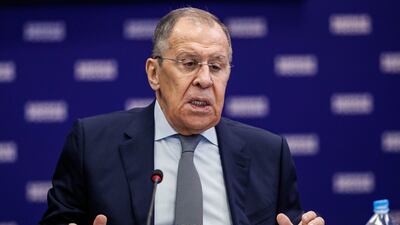Russian Foreign Minister Sergey Lavrov will meet Iraqi Prime Minister Mohammed Shia Al Sudani on Monday to discuss issues of mutual interest, Iraq’s Foreign Ministry spokesman said.
Mr Lavrov will be joined by representatives of Russian oil and gas companies and will also meet Iraq’s Foreign Minister Fuad Hussein, spokesman Ahmed Al Sahhaf said.
Mr Al Sahhaf said the visit will focus on “strategic relations with Russia and to encourage investment opportunities, especially relating to energy sectors”.
Russia has been one of the major energy investors in Iraq, with oil company Lukoil having a 75 per cent stake in the 450,000 barrel per day West Qurna 2 oilfield 65km from the southern port of Basra.
Lukoil hopes to raise production in the field to 800,000 bpd this year, which would constitute around 24 per cent of Iraq’s current production of 3.3 million bpd if the plan is implemented.
Iraq faces challenges raising oil production significantly due to long-delayed plans to increase water injection in its giant southern oilfields, which need treated water to boost output by raising pressure in oil reservoirs.
Russia’s Gazprom also operates the Badra oilfield in southern Iraq as part of an international consortium and, along with Rosneft, has angered Baghdad by signing oil contracts with the semi-autonomous Kurdish Regional Government.
Baghdad insists contracts between the Kurdish Ministry of Natural Resources and foreign oil companies violate the country’s 2005 constitution. Last year, Iraq's Federal Supreme Court ruled that Kurdish oil and gas contracts with foreign companies had no legal basis, causing a fresh crisis in relations between Baghdad and Erbil, capital of the Kurdish region.
Defence ties
Iraq and Russia have also worked together in the defence realm, despite a US-led coalition providing the bulk of support to Iraqi forces during the war against ISIS. The US was Iraq’s main supplier of military equipment after 2003 but following its departure Moscow sharply increased arms deals with Baghdad.
Iraq’s army mainly operates Russian tanks and armoured personnel carriers, purchasing 73 T-90S/SK tanks in 2018 at $4.5 million per vehicle. Iraq also operates Russian attack helicopters such as the MI-28.
The Iraqi army has a long history of operating Russian equipment dating back to the Saddam Hussein regime, when Moscow was Baghdad’s main supplier of military equipment, according to the Stockholm International Peace Research Institute.
Analysts say Iraqi forces prefer to use Russian military systems because of their lower maintenance requirements than US-made equipment, such as the US M1A1 Abrams tank, which Iraq used in the war on ISIS.


